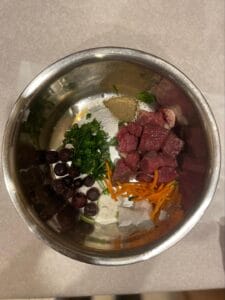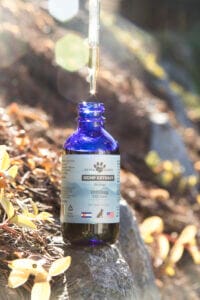Whole foods are integral to a dog’s diet, offering unprocessed, natural nutrients that promote and support long-term health. Unlike processed commercial dog foods, which often contain artificial preservatives and fillers, whole foods provide a range of vitamins, minerals, and antioxidants in their most bioavailable form.
This ensures that dogs not only consume the nutrients they need but also absorb and utilize them efficiently. For example, the beta-carotene found in carrots is more readily converted to vitamin A in the body when ingested as part of a carrot than as a synthetic additive in commercial dog foods. This natural approach to nutrition supports various bodily functions, from enhancing vision to boosting the immune system.
Why Add to Commercial Dog Food
Kibble is easy, but that doesn’t mean it’s healthy. Commercial kibble is cooked at extremely high temperatures, generally several times, which destroys all the nutrients in the food, including vitamins, minerals, and amino acids. To add some nutrients back in, pet food organizations often add synthetic nutrients following the cooking process. There aren’t fresh ingredients nor are the ingredients generally healthy due to being meat offcuts that aren’t exactly considered healthy leftovers.
Natural is nearly always better than synthetic in every aspect of life and, in this case, it’s definitely an appropriate statement. Even if you want to continue feeding kibble or are considering switching to a home cooked or raw diet for your dog, whole foods can help keep your dog in peak health by promoting and supporting long term wellness.
The Best Whole Foods for Dogs
The best whole foods for dogs are those that offer some sort of added benefit. This list isn’t comprehensive, so don’t feel like you need to be limited to just these foods. For this list, we have selected foods that most pet parents would be comfortable with feeding that still add value to their pet’s diet.
Regardless of which foods you choose, remember that variety is crucial in the diet to add other nutrients. You shouldn’t feed the same exact foods for more than several weeks at a time. You also need to make sure they’re eating a nutritionally balanced diet containing all the nutrients they need to stay healthy. That being said, here’s our list of the best whole foods for dogs.
Adding Carrots to Dog Food
Carrots are not just a crunchy treat for humans but also a good whole food full of essential nutrients for our canine companions. Rich in dietary fiber, and vitamin A, these vibrant vegetables play a key role in helping keep our dogs in peak condition. The dietary fiber present in carrots supports the digestive process, supporting normal bowel function while the vitamin A leans more toward maintaining and supporting normal visual function.
That’s right, the vitamin A found in carrots is particularly helpful for supporting ocular health. This vitamin aids in the proper functioning of the retina, supporting eye function, particularly in low light conditions. It also plays a significant role in supporting the immune system.
By enhancing the immune response, vitamin A promotes the body’s innate resistance to pathogens. Plus, vitamin A provides antioxidant protection, helping eliminate free radicals associated with the aging process, which may reduce oxidative stress and support normal cell function.
Integrating carrots into your dog’s diet is remarkably straightforward and convenient. One simple method is to add small, bite-sized pieces of carrot to their regular meals in small quantities. This not only enriches their food with valuable nutrients but also adds an element of crunch and texture that dogs enjoy. Alternatively, carrots can be served as a wholesome snack in between meals. Offering raw or slightly steamed carrot sticks is an excellent way to reward your dog while ensuring they reap the nutritional benefits.
Green Beans in Whole Food Diets
Green beans might not be the first food item that comes to mind when considering healthy whole foods for your canine friend. But what’s surprising is the spectrum of valuable nutrients this veggie has to offer in whole food diets without the added calories.
Green beans contain ingredients rich in iron and Vitamin B12 which are essential nutrients for
hemoglobin formation, the component of red blood cells responsible for supporting healthy cellular activity. Your pet’s diet being high in iron enhances organ function, helping maintain the general health of all breeds and ages.
Green beans also offer a healthy dose of calcium. This mineral is important for helping build and maintain strong bones and teeth—a concern for dogs of all ages, but especially for growing puppies and older dogs. Calcium also supports normal brain and nerve function as well as normal circulatory function.
The plant protein found in green beans is another beneficial component, particularly for dogs on a vegetarian diet or those needing a lower-calorie diet without sacrificing their protein intake. While dogs are primarily carnivorous, they can still draw significant benefits from plant-based proteins, which can add diversity to their diet and provide more of those essential amino acids.
To incorporate green beans into your dog’s diet, consider them as a meal topper or as a standalone snack. Whether served raw, steamed, or boiled (without any added salt or seasoning), green beans can be a crunchy, hydrating treat.
Sweet Potatoes For Your Dog’s Health
Sweet potatoes, often known as one of those foods that support human health, also offer a list of health benefits to our canine companions. These vibrant root vegetables are full to the brim with antioxidants, which may help decrease oxidative damage in the body. Antioxidants such as beta-carotene, the pigment responsible for sweet potatoes’ rich orange hue, not only provides antioxidant protection, but also supports your healthy dog’s skin, coat, and ocular health.
Sweet potatoes provide Vitamin C, manganese, and several B vitamins, all of which support the immune system capable of assisting the body in combating environmental pollutants.
One of the standout features of sweet potatoes is their impressive dietary fiber content. Fiber is indispensable for supporting a well-functioning digestive system. It aids in the smooth transit of food through the digestive tract, thereby supporting bowel health and assisting the body in combating environmental pollutants. This high fiber content also promotes a sense of fullness, which can support proper weight management by preventing overeating.
Integrating sweet potatoes into your dog’s diet is remarkably simple and can be incredibly beneficial to a dog’s health, especially for dogs with sensitive stomachs or those requiring a higher fiber diet to support bowel health. Cooking sweet potatoes and mashing them into your dog’s food is an effortless yet effective way to incorporate this nutrient-rich vegetable into their diet. The cooking process enhances the sweet potatoes’ digestibility, supporting the absorption of essential nutrients.
Adding Pumpkin To Canine Diet For Optimal Health
Pumpkin, a staple ingredient of autumnal cuisine, is renowned not only for its versatility and flavor but also for the substantial health benefits it brings, especially in terms of digestive health for dogs. The secret behind pumpkin’s prowess in supporting gut health lies in its high fiber content. Dietary fiber plays a crucial role in the digestive process, acting as a regulatory agent for supporting bowel health.
The soluble fiber in pumpkin absorbs water, which helps to bulk up your dog’s stool, and may help with occasional gastric distress. But the benefits of pumpkin extend beyond regulating bowel movements.
This orange vegetable is packed with essential nutrients that support physical and mental well-being in our animals. Vitamins such as A, C, and E found in pumpkin support ocular health and enhance the immune response. These vitamins also provide antioxidant protection that can help reduce the effects of normal environmental stress.
Incorporating pumpkin into your dog’s diet is relatively straightforward, and a little goes a long way in reaping its benefits. Opting for canned, unsweetened pumpkin with no added artificial preservatives, spices, or artificial sweeteners, is a convenient and effective way to add this nutrient-rich vegetable to your dog’s meals.
Start by mixing a small amount of pumpkin—usually a teaspoon for smaller dogs and a tablespoon for larger breeds—into your dog’s food.
Apple Slices Also Promote Your Pet’s Health
Apples have quite a few nutritional benefits wrapped in a juicy, crunchy package. But make sure they’re cored and there aren’t any seeds provided to your pup. The seeds contain amygdalin, a compound that releases cyanide when metabolized by the body. Even though the quantity in apple seeds is small, it’s always better to lean on the safe side.
The flesh of apples offers a helpful blend of vitamins and minerals. Vitamins like A and C play important roles: Vitamin A supports vision, a healthy coat and skin, and normal brain and nerve function. Vitamin C enhances the immune response, supports normal detoxification and decreases oxidative damage. Antioxidants contribute significantly to overall health by helping reduce oxidative stress.
Apples also contain soluble fiber to help maintain a healthy digestive tract. The fiber content promotes gut and colon health, supporting healthy waste elimination. It can also support proper weight management by promoting a feeling of fullness. The natural sugars in apples support energy production, making them an ideal snack for active dogs.
Slicing apples into bite-sized pieces not only makes them a convenient and refreshing snack but also ensures that they are easily digestible for dogs. This form of serving can be particularly enjoyable on a hot day, especially since they support hydration levels with their high water content. As a bonus, the crunchy texture of apples can help keep your pup’s teeth healthy and clean.
Chicken For Lean Diet Rich In Amino Acids From Animal Protein
Chicken is an ideal lean protein source, but if your dog isn’t able to consume chicken, go ahead and skip to the next food on the list. If they can consume chicken, adding it to your rotating list of proteins can support a normal metabolic rate and promote a healthy coat and skin. But chicken is desirable for more than just its nutritional profile.
Chicken meat’s lean nature means it’s lower in calories and fat compared to other protein sources, like beef or pork. This characteristic makes chicken an excellent choice for supporting weight loss while still helping support energy production.
There’s a bit of controversy here, though. The raw feeding community offers chicken completely raw, as you can guess by the belief that dogs should eat a raw diet as their ancestors did. Others, like the National Research Council, believe any raw meat must be cooked to get rid of dangerous bacteria.
But then there’s the fact that dogs can’t have cooked chicken bones. However, if the chicken is fed raw as it is within the raw diet, chicken bones are argued to be acceptable since they break instead of splinter.
Adding Fish To Your List of Fresh Foods
Small, oily fishes, like sardines and anchovies, and medium-sized fish including herring and salmon, are full of omega-3 fatty acids. Alternating between protein sources encourages variety within the diet and may help with any nutritional gaps in your dog’s diet. Omega-3 is known to promote normal inflammatory pathways,
Most pet parents provide their dogs with fish oil rather than fish itself, but unfortunately, fish oil is prone to rancidity. That means that the fish oil being provided may not be providing many (if any) nutrients at all. Make sure you steer clear of large fish, too. Their bodies tend to accumulate toxins easier than smaller fish.
In the raw feeding community, fish are provided completely raw in most cases. Before they’re served though, they must be stored in the freezer for two weeks to kill off any bacteria. If you cook the fish, whether large or small, be wary of bones. Raw bones crack whereas cooked bones splinter. If you grab canned fish, make sure it’s canned in water rather than oil.
Adding Full Spectrum CBD Oil for Dogs Is Another Healthy Move
Full spectrum CBD oil, extracted from the hemp plant, contains all phytochemicals naturally found in the plant, including CBD (cannabidiol), trace amounts of THC (tetrahydrocannabinol), and terpenes. This combination of components works synergistically, promoting the effects of each through a phenomenon known as the entourage effect.
Full spectrum CBD oil, found in the extracts available at Earth Buddy, is known to promote homeostasis. Homeostasis is the biological term for the process by which living organisms regulate their internal environment to maintain a stable, constant condition, which supports and promotes long-term health.
CBD is known for its ability to interact with the endocannabinoid system (ECS) in mammals, a complex cell-signaling system that plays a role in supporting a variety of functions and processes, including sleep, mood, appetite, and immune response. By supporting the ECS, full spectrum CBD oil can support normal bodily functions. And the carrier oil is coconut oil, adding MCT to your dog’s diet supporting a healthy coat.
When adding full spectrum CBD oil to your dog’s daily routine, it’s crucial to start with a low dosage and gradually increase it based on your dog’s response. Some companies have their recommended dosages labeled as well which may help you determine where to start.
Moving to a Whole Food Diet for Dogs
Transitioning to a healthy whole food diet for dogs can be beneficial, but it’s crucial for pet owners to be mindful of the potential risks and nutritional gaps that may arise. Whether you feed a raw food diet, cooked homemade, or regular kibble, it’s important to discuss additions to the diet with your veterinarian so you’re aware of any health risks.
Every dog is different and what may be good for some dogs may not be for others. You also need to be cautious when it comes to fat-soluble vitamins since they can accumulate within the body, unlike water-soluble vitamins that are excreted when in excess.
For further reading, we recommend:
- https://nap.nationalacademies.org/resource/10668/dog_nutrition_final_fix.pdf
- https://www.ncbi.nlm.nih.gov/pmc/articles/PMC9291198/
- https://link.springer.com/article/10.1186/s13099-017-0218-5
- https://onlinelibrary.wiley.com/doi/10.1111/jpn.13626
- https://vetnutrition.tufts.edu/2017/12/does-an-apple-a-day-keep-the-vet-away-harmful-vs-healthy-foods-for-pets/
- https://www.ncbi.nlm.nih.gov/pmc/articles/PMC10030350/#:~:text=Proximate%20analysis%20of%20different%20pumpkin,carbohydrates%20(8.66%E2%80%9327.35%25).
- https://www.ncbi.nlm.nih.gov/pmc/articles/PMC9405924/
- https://www.researchgate.net/publication/221866355_Safety_evaluation_of_vitamin_A_in_growing_dogs
You Might Also Enjoy
Your dog’s skin is their largest organ making dog skin care a crucial part of…
Like us, our dogs, and other mammalian species, cats have an endocannabinoid system. This system…
Learning how to calm a dog down is an essential skill to have in your…







